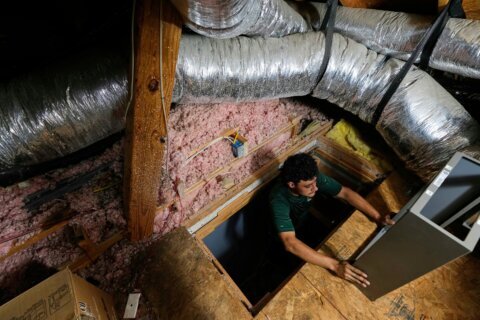WASHINGTON — An increasing number of pest control companies are promising to control backyard mosquitoes. But consumers need to ask questions before shelling out big bucks to reduce the number of bugs.
Terminix, which for years has battled termites and other household pests, is now tackling the backyard mosquito problem using garlic oil on shrubs and other foliage.
Other companies don’t use the same type of control methods.
“Many will come out and spray a residual barrier pesticide … these can provide several weeks of control,” says Joe Conlon, technical adviser for the American Mosquito Control Association.
Some firms, like Terminix, are advertising so-called organic or natural solutions, including cedar wood oil and oil of clove.
“I would not suggest anybody use a company that’s using products that are not EPA registered and these essential oils are not EPA registered,” Conlon says.
Conlon says the lack of EPA registration doesn’t necessarily mean that the solution poses a health risk, but it indicates that what’s being offered hasn’t been proven effective by the EPA.
Consumers should know exactly what technicians are planning to spray into their yards.
“They absolutely should ask what they’re using and see a label for that product and the label on the product should tell them if it’s EPA registered or not,” Conlon says.
The American Mosquito Control Association is a scientific/educational, not-for-profit group that is devoted to the suppression of mosquitoes.
The association does not endorse the use of timed-misting systems.
“They put pesticides unnecessarily out into the environment which kills non-target insects and promote resistance in insects … I would stay away from misting systems,” Conlon says.
Conlon says any pest control service worth its salt will do a thorough yard survey before applying any pesticides.
“If the mosquito people come out and they don’t do a thorough survey to find out what places in your yard are breeding mosquitoes, then I wouldn’t use them at all,” Conlon says.
Conlon says propane trapping systems are ineffective.
“They will capture and kill mosquitoes,” Conlon says. “They’re probably not going to make a dent in your mosquito population.”
Electronic devices that kill flying insects have been around for a long time, killing insects attracted to their light.
“Bug zappers are worthless, absolutely worthless, if you look at the capturing dishes you’ll find all kinds of moths and June beetles, you’re not going to find many mosquitoes at all,” Conlon says.
What’s the best mosquito control? Conlon says it’s Mosquito Abatement Districts, operated by some counties and communities, more common in Virginia than in Maryland. Conlon says Abatement Districts use an integrated approach to mosquito control, surveying mosquito populations and intervening at their various life cycles to limit their numbers.
He says these abatement programs are not only the safest for humans and the environment, but also the most effective and least expensive options.
Conlon says such programs cost taxpayers just a few dollars over the summer and can successfully limit mosquitoes in backyards. Consumers should expect to spend several hundred dollars over the summer on commercial services.








